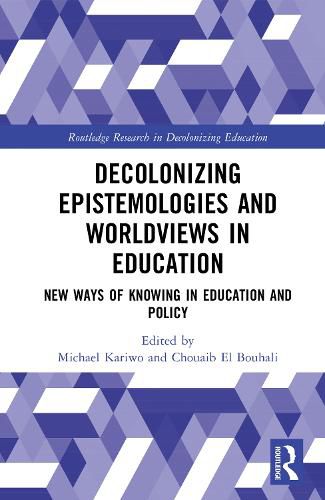Readings Newsletter
Become a Readings Member to make your shopping experience even easier.
Sign in or sign up for free!
You’re not far away from qualifying for FREE standard shipping within Australia
You’ve qualified for FREE standard shipping within Australia
The cart is loading…






This edited volume examines the decolonization of worldviews and ways of knowing in education and educational policy. It critically challenges the Western interpretation of epistemology and ontology, providing a platform for contributors to demonstrate how concepts of decolonization, knowledge and worldviews are understood, as well as the impact of these understandings in creation of policies and practices in education and pedagogy. It also offers insight into related themes on student resilience, English language, the internationalization of western knowledge, indigenous paradigms, and curriculum transformation. Chapter authors present new understandings of decolonizing knowledge and diversity, analysis of non-Western and indigenous epistemologies and worldviews, and examples of implementation of equity in policy and education through case studies. Creating and initiating a platform for wider debate, it will ultimately appeal to scholars, researchers, policy makers and educational leaders concerned with decolonizing education and policy in North America and beyond, and with interests in indigenous education, decolonizing education, sociology of education, and philosophy of education.
$9.00 standard shipping within Australia
FREE standard shipping within Australia for orders over $100.00
Express & International shipping calculated at checkout
This edited volume examines the decolonization of worldviews and ways of knowing in education and educational policy. It critically challenges the Western interpretation of epistemology and ontology, providing a platform for contributors to demonstrate how concepts of decolonization, knowledge and worldviews are understood, as well as the impact of these understandings in creation of policies and practices in education and pedagogy. It also offers insight into related themes on student resilience, English language, the internationalization of western knowledge, indigenous paradigms, and curriculum transformation. Chapter authors present new understandings of decolonizing knowledge and diversity, analysis of non-Western and indigenous epistemologies and worldviews, and examples of implementation of equity in policy and education through case studies. Creating and initiating a platform for wider debate, it will ultimately appeal to scholars, researchers, policy makers and educational leaders concerned with decolonizing education and policy in North America and beyond, and with interests in indigenous education, decolonizing education, sociology of education, and philosophy of education.